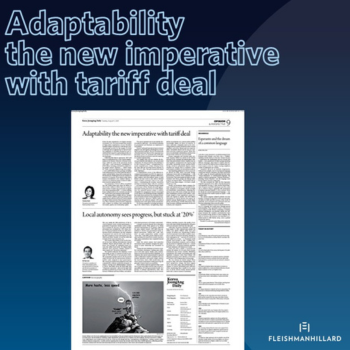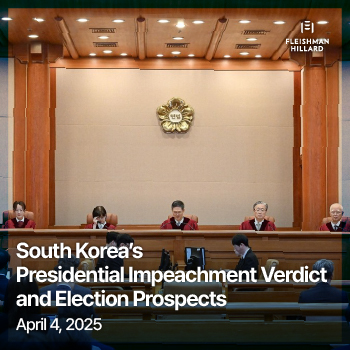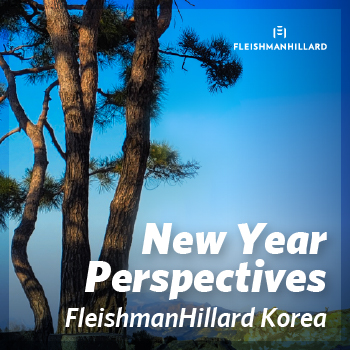FH Newsletter: 2025 South Korean Presidential Election Insights

2025 South Korean Presidential Election: Lee Jae-myung Clinches Decisive Victory
There were no surprises in South Korea’s 21st presidential election, held on June 3rd. Lee Jae-myung, the candidate from the Democratic Party (Minjoo Party), secured a resounding victory with 49.42% of the vote, becoming the nation’s new president with a commanding lead over his rivals.
Following the official confirmation by the National Election Commission on June 4th, President-elect Lee was inaugurated and immediately commenced his duties from the presidential office in Yongsan foregoing the usual transitional committee process. He will move to the Blue House as soon as the repairs are completed.
With the Democratic Party holding a commanding majority in the National Assembly, the new administration enters office with robust control over both the executive and legislative branches.
Challenges Ahead for the New Administration
Despite the clear mandate, President Lee faces significant challenges. Economic growth is projected to remain stagnant at around 0% this year. Social tensions are at an all-time high, and the country’s political system—established in 1987—is showing its limitations, making constitutional reform increasingly unavoidable.
Successfully navigating these challenges will require not only decisive leadership from the president and government but also the collective will and effort of the Korean people.
In this special election briefing, we will examine the factors behind Lee Jae-myung’s victory, the policy direction of the incoming administration, the unique characteristics of this election, and its broader implications for the Korean market and business community.
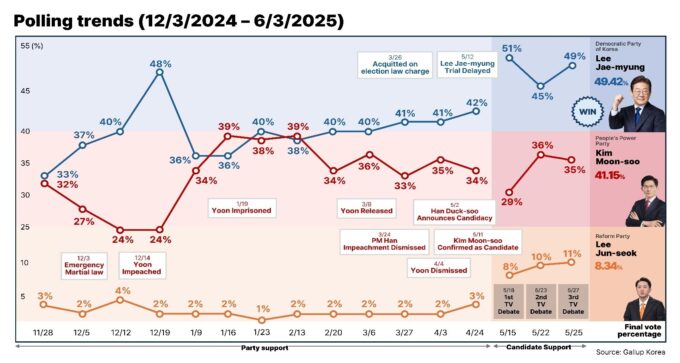

#1. Lee Jae-myung’s Victory: A Triumph of Communication Strategy
Elections are usually unpredictable, but this time, Lee Jae-myung’s careful planning removed much of the uncertainty. After the December 3rd Emergency Martial Law Incident and the impeachment of former President Yoon Seok-yeol, public demand for change was high. Lee maintained a strong lead in every poll for the past six months.
Lee unified the progressive base with the slogan “End the Rebellion” and appealed to moderates by positioning the Democratic Party as centrist-conservative. He avoided controversy, refrained from attacking rivals, and focused on positive, responsible leadership. Any potential issues were quickly addressed with humble explanations or apologies.
Throughout the campaign, Lee used moderate language and avoided making bold promises, presenting himself as cautious and inclusive. He consistently targeted the already-disgraced former president, keeping his message clear. By focusing on defense and avoiding mistakes, Lee’s strategy of caution and communication led to a decisive victory.

Twelve days before the presidential election, a Gallup Korea survey evaluated candidates’ images across seven key policy areas: economy, social welfare, national security, diplomacy, science and technology, climate change/environment, and conflict resolution/national unity. Using correspondence analysis, FleishmanHillard’s TGI Data Analytics Team visualized how voters perceived each candidate’s strengths.
Lee Jae-myung was positioned at the center of policy clusters related to social welfare, economy, conflict resolution/national unity, and climate/environment—areas seen as inclusive and friendly to ordinary citizens. This indicated that voters associated Lee most strongly with people-focused and unifying policies, distinguishing him clearly from his rivals. In addition, an analysis by the FH TGI team of the remarks made during the three TV debates (a total of 22,428 words) found that the keywords were clearly distinguished as “Economy, Growth” for Lee Jae-myung and “Trial, Impeachment” for Kim Moon-soo.
#2. ‘Ruling Party Dominance’ in the National Assembly and Government
After winning 175 out of 300 seats in last year’s legislative election, the Democratic Party (DP) now holds a commanding majority in the National Assembly. Combined with Lee Jae-myung’s presidential victory, this creates a classic “ruling party large, opposition small” power structure, giving the DP control over both the executive and legislative branches until at least the next general election in 2028.
The party itself has become strongly unified under Lee, with most lawmakers now belonging to the pro-Lee faction, while the previously influential pro-Moon Jae-in group has largely disappeared. Lee secured the DP’s presidential nomination with a record-breaking 89.77% of the vote, far surpassing previous records.
With this dominance, the Lee administration can now easily pass legislation that was previously blocked by the opposition and presidential vetoes during the Yoon administration. This is expected to speed up government policy implementation, especially on economic and social issues. However, the lack of checks and balances between the branches has raised concerns among the public and business community about potential overreach.
Judicial reform is a particular focus. The DP has pledged to limit prosecutorial powers and increase the number of Supreme Court justices, though a recent proposal to appoint non-lawyers as justices was withdrawn after public backlash. Critics warn that if the government’s influence extends to the judiciary, it could undermine the principle of separation of powers, a cornerstone of democracy.
On the other hand, the clear east-west divide in voting rates highlights the growing severity of regional conflict. Exit polls also show that people in their 40s and 50s overwhelmingly supported the Democratic Party, while those over 70 favored the People Power Party. Among voters in their 20s and 30s, men tended to support the conservative People Power Party and Reform Party, while women favored the progressive Democratic Party.

#3. President-elect Lee Emphasizes Being a “Great Unifying President,” Not a “Half-President”
One of South Korea’s most serious problems today is national division. The country has become deeply fractured along lines of age, gender, region, class, and ideology, with political conflict growing ever deeper. Instead of resolving these divisions, politicians have often fueled confrontation and discord. This was evident in the recent presidential campaign, which was marked by negative tactics. There were 26 cases of candidates accusing each other of spreading false information—far more than the 18 cases in the 19th election and 10 in the 20th. Perhaps some believed that attacking opponents would be the quickest way to gain votes. However, this came at the expense of valuable opportunities for policy discussion and scrutiny of candidates’ promises, making national unity even harder to achieve.
After the third televised debate, President-elect Lee Jae-myung remarked, “This presidential election, which should have been about sharing policies, visions, and hope for Korea, has been filled with slander, insults, and unspeakable words of hate.” He added, “There is no future in the old, outdated politics of endless division and conflict. It must end now.” Lee emphasized the need for a president who unites the country, saying, “We desperately need a president for all, not a ‘half-president’ who only looks to one side and suppresses the other, but a ‘great president’ who brings true unity.”
The entire nation hopes Lee will maintain this resolve. Former President Moon Jae-in once said in his inaugural address, “I will be president for all the people,” and former President Yoon Suk-yeol pledged to “make Korea a country where the people are the true owners,” but neither was able to fulfill these promises. There is hope that Lee will be the first to break this cycle.
#4. How Far Can the Democratic Party’s “Right Turn” Go?
President-elect Lee Jae-myung has taken unprecedented steps for a Democratic Party candidate, declaring the party “centrist-conservative” rather than progressive. He has argued that growth is a prerequisite for redistribution, advocated for both renewables and nuclear energy, and emphasized deregulation and support for high-tech industries like semiconductors and AI. Lee’s campaign messaging and even his choice of red and blue attire signaled a deliberate appeal to moderates and conservatives, branding himself as a “competent leader, not left or right.”
Analysis of Lee’s campaign communications shows he prioritized economic growth and industry over traditional progressive themes like labor and equality. While it’s debated whether this shift is a tactical move to win centrist votes or reflects Lee’s genuine beliefs, many observers—and voters—expect the latter.
Lee’s economic agenda includes strong support for advanced industries, deregulation for innovation, and targeted support for small businesses and vulnerable groups. At the same time, he plans to tighten corporate governance rules, strengthen fair trade and platform regulations, and enhance workers’ rights.
Alongside prosecutorial reform, the Ministry of Economy and Finance is the main target for government restructuring. It is considered almost certain that the MOEF’s budget authority will be separated—options under review include transferring this authority to the presidential office or the prime minister’s office, or establishing a new government agency dedicated to budget matters.
On foreign policy, Lee has moved closer to the US and Japan, downplaying past progressive stances and emphasizing pragmatic alliances, which has helped him gain support in traditionally conservative regions. However, this rightward shift has unsettled some traditional progressives and raised questions about how far the party can go without losing its base.
Lee’s “right turn” is seen both as a practical adaptation to changing political and economic realities and a calculated strategy to broaden the party’s appeal. Whether this centrist pragmatism will persist or revert under pressure from within the party remains to be seen.
#5. From Conflict and Division to Cooperation and Inclusion
The reality facing the Lee Jae-myung administration is grave. South Korea is experiencing unprecedented crises across politics, the economy, and society. Domestic demand is stagnant, and U.S.-imposed tariffs are clouding export prospects. As a country heavily reliant on exports, Korea now faces the end of the era of peaceful globalization and the onset of a harsh era of international trade wars. Security challenges, including North Korea’s nuclear program and the U.S. military presence, remain serious concerns. Socially, further division and conflict must be prevented, and a new political system suited to the times should be established through constitutional reform.
President-elect Lee has already pledged to change the presidential term from a single five-year term to a four-year, two-term system and to significantly strengthen the powers of the National Assembly. Major reforms in pensions, healthcare, and labor—unfinished business from the previous administration—have also been inherited. Fundamental solutions are urgently needed for deep-rooted issues such as the climate crisis and the challenges of low birth rates and an aging population.
No matter how strong a president or government may be, these challenges cannot be overcome by the administration alone. The government must take the lead, but also appeal for the cooperation and support of the people.
Above all, national unity must be achieved by overcoming conflict and division, and this requires the new administration to demonstrate cooperative and inclusive leadership. The new government, formed just two months after the previous administration was impeached, essentially starts with a clean slate. As a pragmatist, President Lee is expected to respond flexibly to issues as they arise, without being bound by preconceived notions.
Now, citizens—regardless of whom they supported—must accept the election results. As former U.S. President Kennedy said, “Ask not what your country can do for you—ask what you can do for your country.” The lesson of this election is that the new president must lead with unity and cooperation, while citizens fulfill their roles as mature participants in democracy
![]()


Below is a summary of the Democratic Party’s key economic policy pledges, grouped into seven themes, along with suggested proactive strategies for companies:


President-elect Lee Jae-myung was born in 1963 in Andong, North Gyeongsang Province, as the seventh of nine siblings. During his youth, he worked as a factory laborer and suffered a disability due to an industrial accident. He completed middle and high school through qualification exams and went on to study law at Chung-Ang University. In 1986, he passed the national bar exam and began his career as a human rights lawyer.
Lee later served as Mayor of Seongnam, Governor of Gyeonggi Province, and leader of the Democratic Party. As Mayor of Seongnam, he was the first local government leader in Korea to declare a moratorium and implemented free welfare policies. He is known for his active communication on social media, strong drive, pragmatic approach to administration, and advocacy for solidarity with the underprivileged.
According to media reports, Lee’s key personal network includes the “Group of Seven,” aides from his time in Seongnam City and Gyeonggi Province, the think tank “Growth and Integration,” new pro-Lee lawmakers, and the KDLC(Korea Decentralized Democratic Leaders’ Conference). He is recognized for his practical personnel management style, flexibly appointing talent according to the situation.
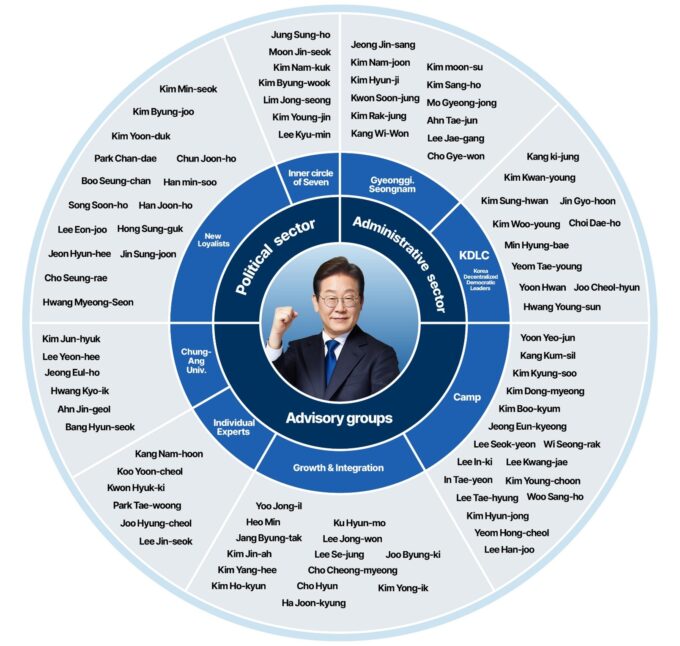

Download: FH 2025 South Korean Presidential Election Insights
Find Out More
-
Adaptability the new imperative with tariff deal
August 5, 2025
-
[FH] South Korea New Year Perspectives
January 2, 2025
